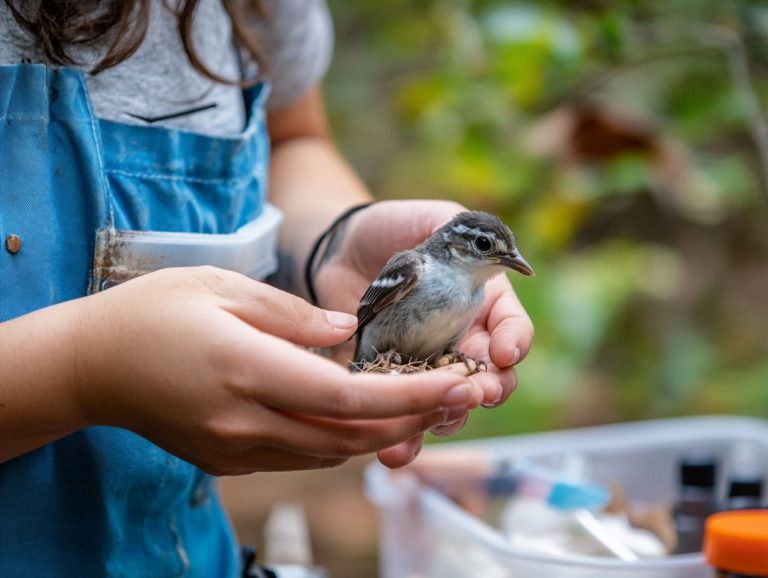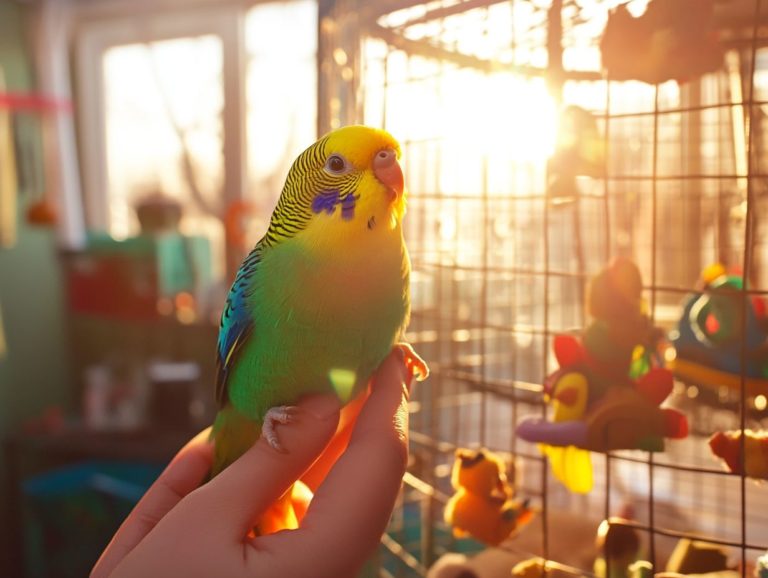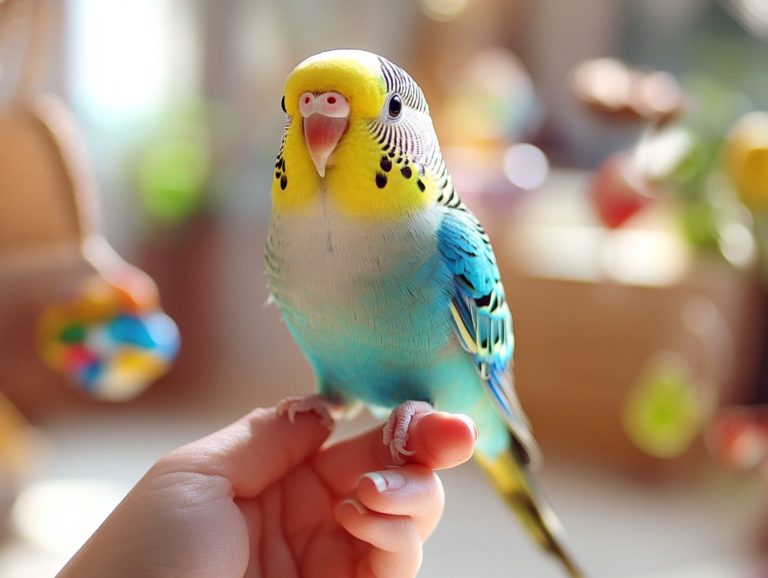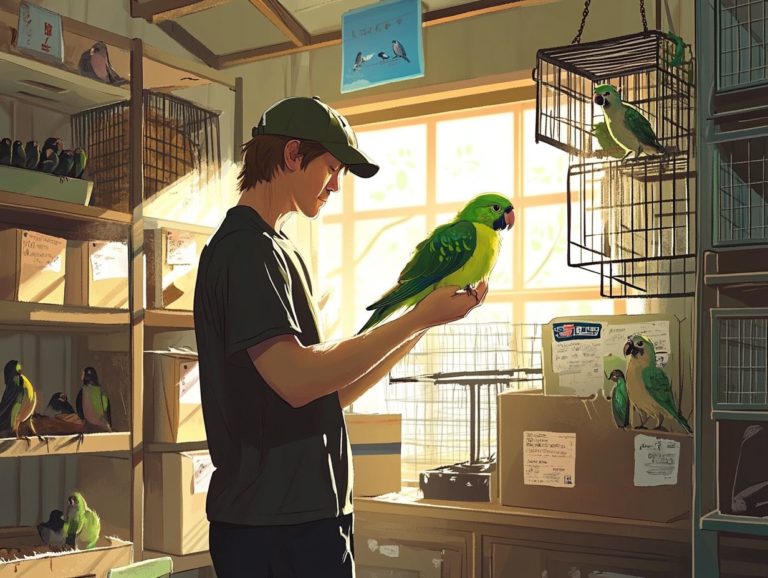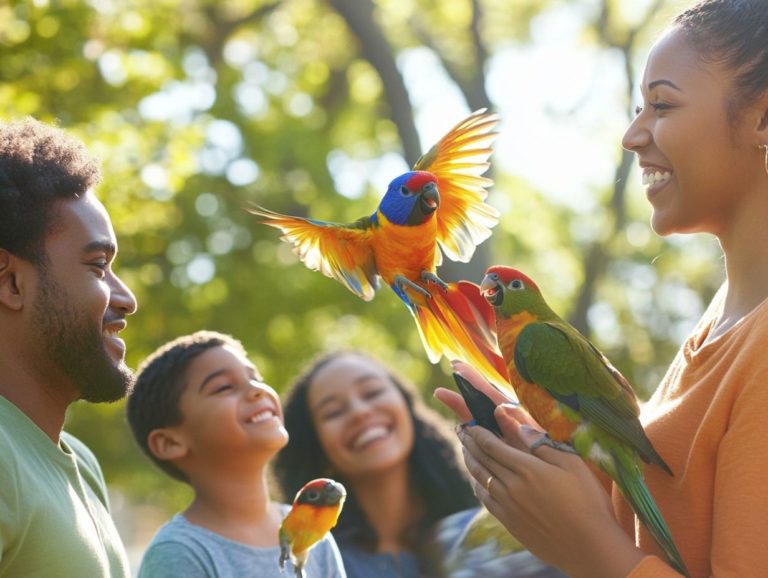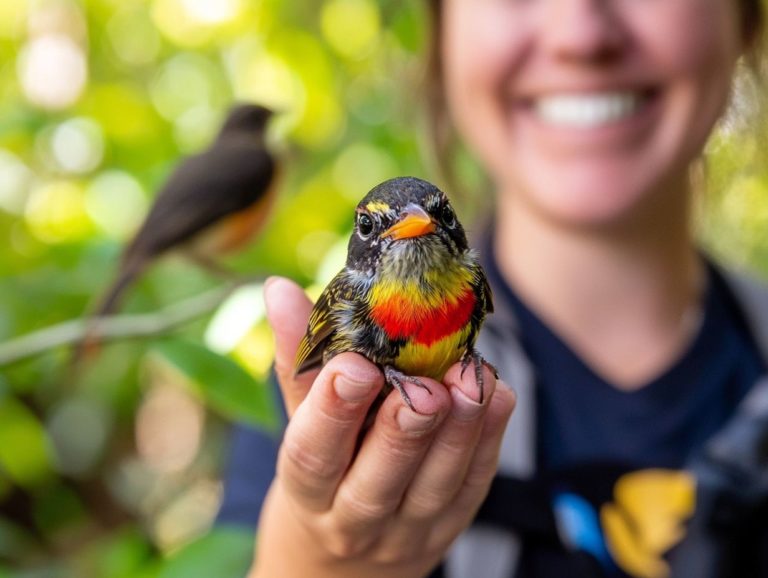How to Handle Behavioral Issues in Adopted Birds
Adopting a bird, such as a baby parrot, is an exciting and fulfilling journey, but it often brings its unique challenges, particularly concerning behavioral issues in pet birds.
Understanding the common causes and triggers of these behaviors, including hormonal influences, is essential for nurturing a happy and healthy environment for your feathered friend. This guide explores effective strategies for managing aggression, building trust to overcome fear, and tackling challenges like separation anxiety and excessive screaming.
It also explains when to consult an avian vet for help. With the right approach, you can build a caring relationship with your adopted bird, enhancing both their well-being and your own.
Contents
- Key Takeaways:
- Know Your Bird: Understanding Their Behavior
- Addressing Aggression in Adopted Birds
- Dealing with Fearful Behavior in Adopted Birds
- Handling Other Behavioral Issues in Adopted Birds
- Creating a Positive Relationship with Your Adopted Bird
- Seeking Professional Help for Severe Behavioral Issues
- Frequently Asked Questions
- What are some common behavioral issues in adopted birds?
- Why do adopted birds often have behavioral issues?
- How can I help my adopted bird overcome its behavioral issues?
- What should I do if my adopted bird shows signs of aggression?
- Will my adopted bird’s behavioral issues ever completely go away?
- Can handling techniques help with my adopted bird’s behavioral issues?
Key Takeaways:
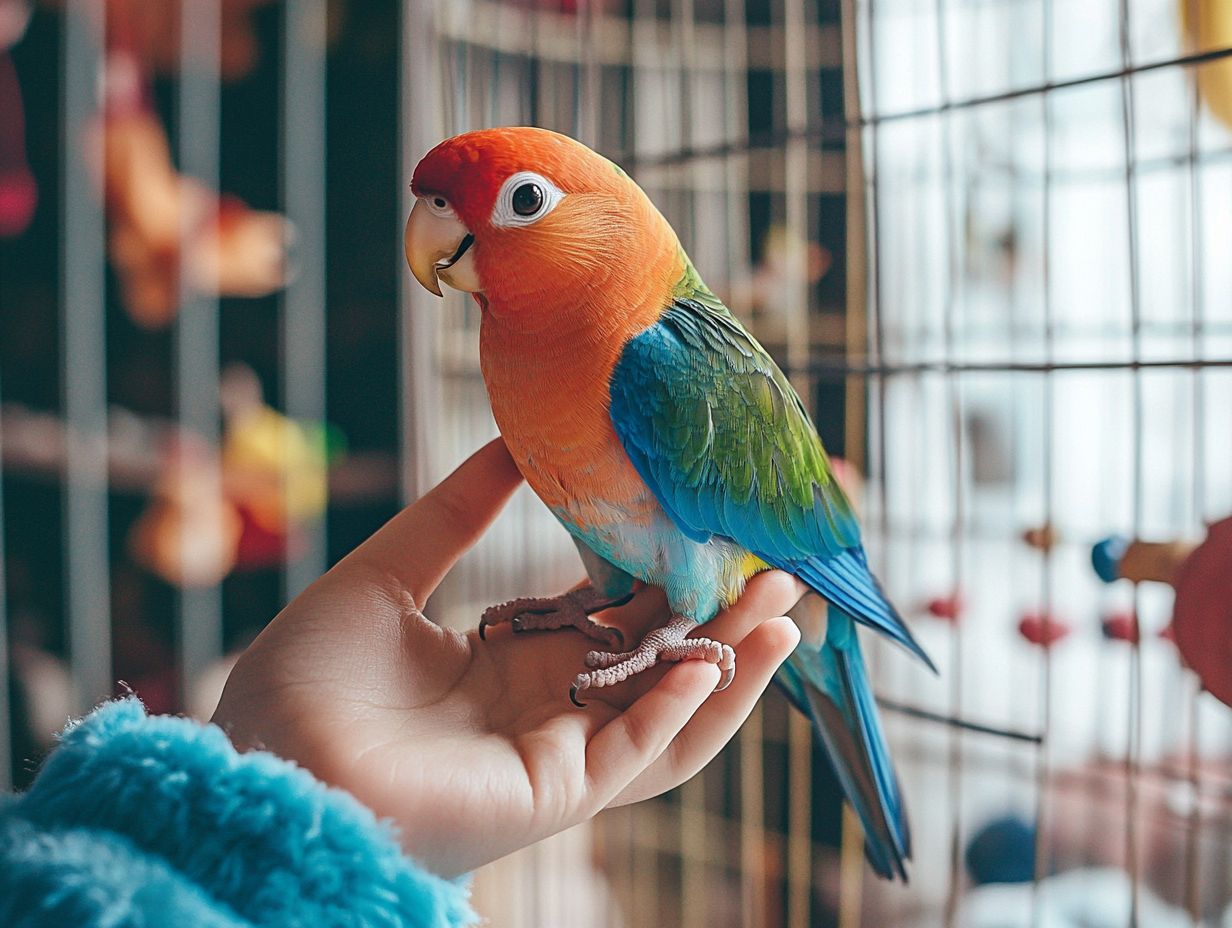
Know Your Bird: Understanding Their Behavior
Understanding behavioral issues in adopted birds is important for pet owners who want to build a caring relationship and prioritize the well-being of their feathered friends. Birds like Cockatoos and other species show distinct behavioral patterns influenced by hormonal behavior, which may present as aggression, fear, or other challenges.
These issues often stem from past experiences, environmental factors, or hormonal changes. Recognizing and addressing these aspects with care is essential. By consulting an avian veterinarian and using positive reinforcement training techniques, you can help your birds adapt and thrive in their new environments.
Common Causes and Triggers
Common causes and triggers of behavioral issues in adopted birds can be broadly categorized into environmental factors, hormonal influences, and feeding triggers. Understanding the lifecycle of adopted birds, including their emotional and attention needs, is essential for creating a nurturing environment that meets your bird’s needs.
Consider environmental factors: loud noises, bright lights, or the presence of unfamiliar pets. These can cause anxiety, especially in sensitive species like Sun Conures. When overstimulated, these birds may react with aggression or excessive vocalizations, showcasing the unique behaviors of parrots that require understanding.
On the other hand, Moluccan Cockatoos can display unpredictable behavior during mating seasons due to strong hormonal urges, especially if they lack appropriate outlets for their energy. These shifts can heighten anxieties or provoke aggressive tendencies, highlighting the need for a stable environment and behavioral modifications.
Addressing Aggression in Adopted Birds
Addressing aggression in adopted birds is vital for building a trusting relationship with your feathered companion. Implementing behavioral modifications through positive reinforcement techniques is key to alleviating aggression issues and understanding aggressive behavior in birds. This enables birds to learn more appropriate behaviors while enhancing their emotional well-being.
Employing strategies like stepping up and using effective communication methods, along with understanding bird body language, can significantly influence how your bird interacts with you and its environment.
Start building a loving bond with your feathered friend today!
Effective Training and Management Techniques
Effective training and management techniques are vital in addressing aggression issues in adopted birds, ensuring they receive the emotional and social support they deserve. By employing strategies like trust-building, consistent interaction, and nurturing independence, you can foster a nurturing relationship that is essential for reducing fear and aggression.
Establishing a routine that emphasizes positive reinforcement, or rewarding good behavior, not only modifies undesirable behaviors but also strengthens the bond between you and your bird.
To further elevate your training success, consider incorporating methods like clicker training and target training, which are effective techniques. These methods encourage your bird to respond positively to cues while promoting its independence.
Successful training programs often benefit from the guidance and expertise of an avian veterinarian. They can offer invaluable insights into your bird’s specific needs and potential behavior problems. Regular check-ins with the vet can lead to tailored approaches that align with your bird’s emotional well-being.
By focusing on these techniques and understanding their specific attention needs, you and your bird can cultivate a more harmonious and fulfilling relationship.
Dealing with Fearful Behavior in Adopted Birds
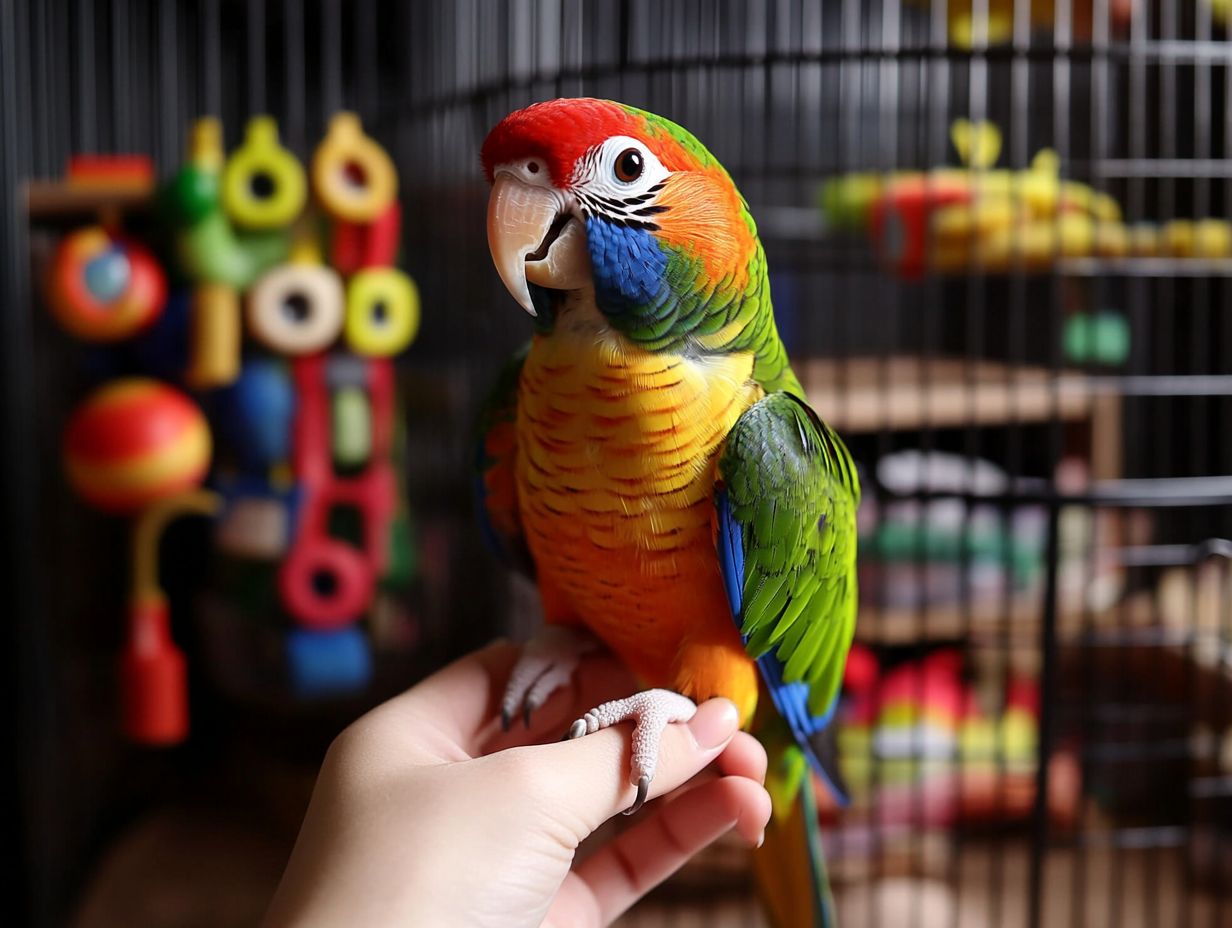
Act quickly to address fearful behavior in adopted birds to cultivate a strong trust relationship and foster their emotional well-being. Understanding their unique behavioral patterns will allow you to manage their fears more effectively, and learning how to help your bird adjust to change can be invaluable in this process.
Birds, being sensitive emotional creatures, often display fear responses rooted in past traumas or insufficient social interaction, which can lead to more complex behavior problems.
Create a nurturing environment that prioritizes safety and security to foster trust. This environment encourages healthy social interactions and significantly reduces fear-based reactions.
Building Trust and Creating a Safe Environment
Building trust and creating a safe environment for your adopted birds are essential steps in reducing fearful behavior and encouraging positive interactions. Foster trust through consistent, gentle interactions and monitor behaviors to help your birds acclimate to their new surroundings and develop healthier behavioral patterns.
Keep an eye on their behaviors and respond appropriately to signs of fear. This attentiveness can drastically enhance the quality of life for both you and your feathered friends.
Provide opportunities for independent play, including engaging with pets through toys. This is another vital strategy that can significantly contribute to your trust-building journey. Allowing your birds to explore their environments with appropriate toys gives them a sense of autonomy, which often helps alleviate anxiety.
When adopting a parrot and introducing a new bird to your existing pets, ensuring a proper quarantine period is crucial. Observe their reactions and adjust interactions based on their comfort levels during this time to minimize stress.
By attentively monitoring these behaviors and conducting behavioral assessments, you can gain valuable insights that lead to more personalized care, fostering a lasting partnership built on trust and mutual understanding.
Handling Other Behavioral Issues in Adopted Birds
Addressing behavioral issues in adopted birds, such as separation anxiety, screaming, and destructive tendencies, necessitates a thoughtful approach that prioritizes their emotional needs and understanding the behavior of adopted birds. These behaviors often emerge from feelings of insecurity or insufficient social interaction. It is crucial to identify and tackle these challenges without delay.
Establishing a routine that includes training techniques and environmental enrichment can significantly mitigate these problems, fostering a happier and healthier life for your feathered companion.
Separation Anxiety, Screaming, and Other Challenges
Separation anxiety and screaming are common hurdles you may encounter as an owner of adopted birds. Tackling these issues is key to building an amazing bond and creating a supportive environment. Your birds might show these behaviors due to feelings of loneliness or a lack of social interaction. It s essential to conduct behavioral checks to uncover the root causes of their problems.
Engage your feathered friends with positive reinforcement techniques, like rewarding calm behavior. This approach fosters a powerful link between quiet moments and positive outcomes, enhancing their health.
Incorporating activities that stimulate your birds can keep them entertained and content. For example, providing toys that encourage foraging or setting up social routines with you or other pets will nurture interaction.
Implementing thorough pet care strategies, such as regular exercise and mental stimulation, helps cultivate a harmonious living environment. This minimizes stressors that contribute to behavioral issues and addresses their attention needs.
Ultimately, creating a well-rounded experience for your avian companions through structured routines and engaging activities will reduce anxiety and promote a peaceful atmosphere in your home.
Creating a Positive Relationship with Your Adopted Bird
Cultivating a positive relationship with your adopted bird is crucial for enriching your companionship. By establishing a nurturing environment that prioritizes understanding bird behavior and positive reinforcement, you can build a sense of affection, allowing your bird to feel secure and encouraging good behavior.
Use strategies like setting clear behavioral expectations and reinforcing positive interactions. This will help you build a trust account that enhances the quality of life for both you and your feathered friend.
Building a Bond and Improving Behavior
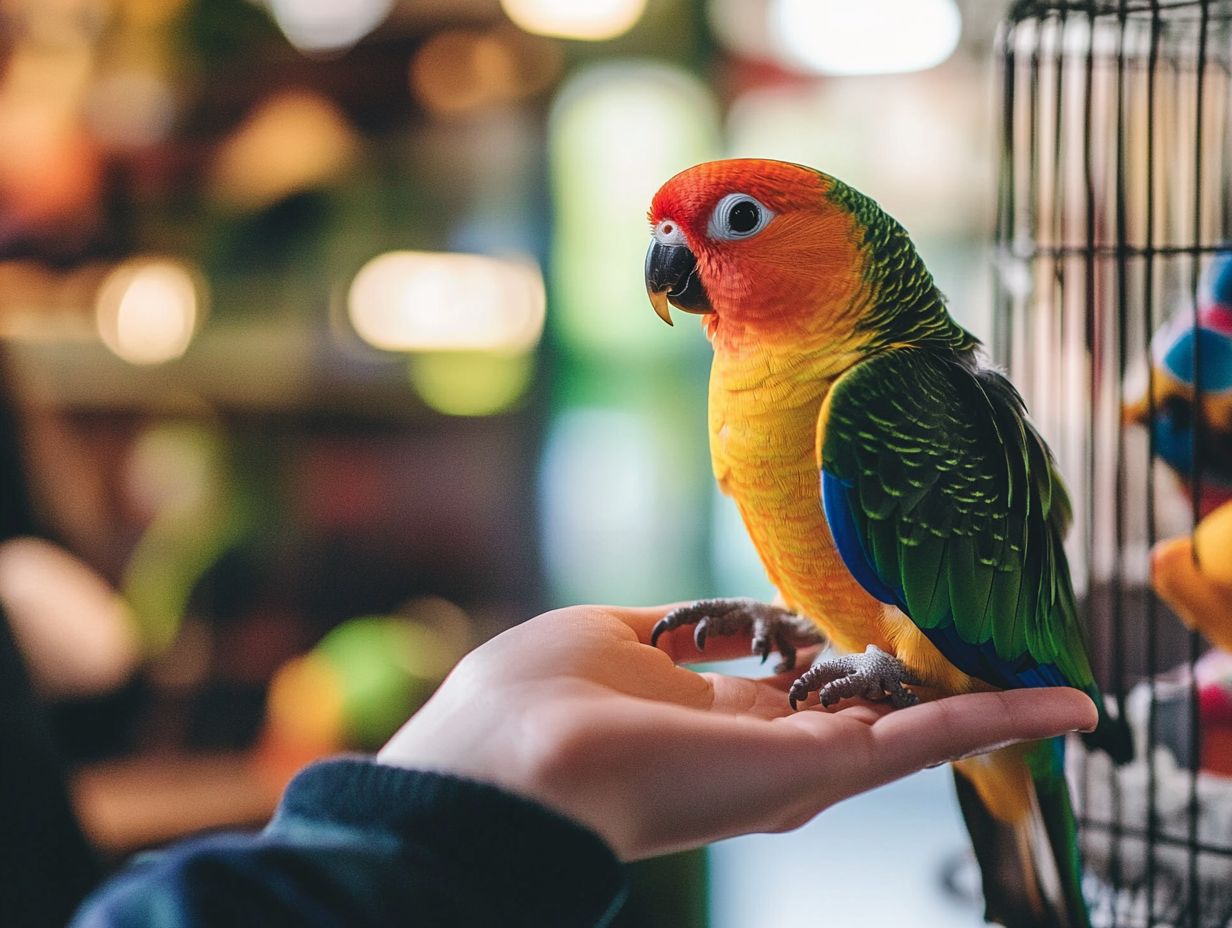
Building a bond and improving behavior in your adopted birds depends on consistent interaction strategies focused on establishing trust. Engaging in activities that meet your bird’s mental and physical needs is essential; it reinforces positive behaviors and deepens your connection.
Encouraging independent play allows your bird to develop its natural instincts while boosting its confidence. Introduce puzzle toys and foraging opportunities to promote mental engagement. Using positive reinforcement can further elevate behavior by rewarding desirable actions with treats or praise.
This approach enhances learning and creates a playful atmosphere where your bird feels secure. Thoughtful interaction strategies foster a respectful and loving environment, ensuring your bond grows stronger as trust and communication flourish.
Start these practices today and watch your relationship flourish!
Seeking Professional Help for Severe Behavioral Issues
Seeking professional assistance for serious behavioral issues in your adopted birds is vital for the well-being of both the bird and yourself. Understanding the benefits of adopting older birds can also help in addressing these challenges. When issues like excessive aggression, severe separation anxiety, or destructive behavior persist despite your best efforts, it’s time to consult an avian vet or a bird behavior specialist.
These experts can conduct comprehensive behavioral assessments, uncover underlying causes, and recommend personalized strategies to help you achieve the harmony you desire.
When to Consult a Bird Behavior Specialist
Recognizing when to consult a bird behavior specialist is crucial. Persistent behavioral patterns can indicate deeper emotional or psychological issues.
If your bird shows consistent aggression, fear, or other troubling behaviors that don’t seem to improve with standard training techniques, it s time to reach out for professional help. A bird vet or a certified bird behavior specialist can conduct a thorough consultation to uncover the root causes and suggest effective strategies for improvement.
Common signs that indicate a need for consultation include noticeable changes in your bird’s demeanor, such as increased withdrawal, feather plucking, or excessive screaming.
If these complex issues are ignored, they can escalate, complicating the bond between you and your feathered friend.
Expert guidance provides invaluable support, offering tailored insights and solutions that cater to your bird s specific needs. Addressing these concerns with a specialist enhances your bird’s quality of life and cultivates a more harmonious environment for both you and your pet.
Frequently Asked Questions
What are some common behavioral issues in adopted birds?
Some common behavioral issues in adopted birds include aggression, feather plucking, screaming, and fearfulness. To address these challenges, consider implementing socialization tips for newly adopted birds.
Why do adopted birds often have behavioral issues?
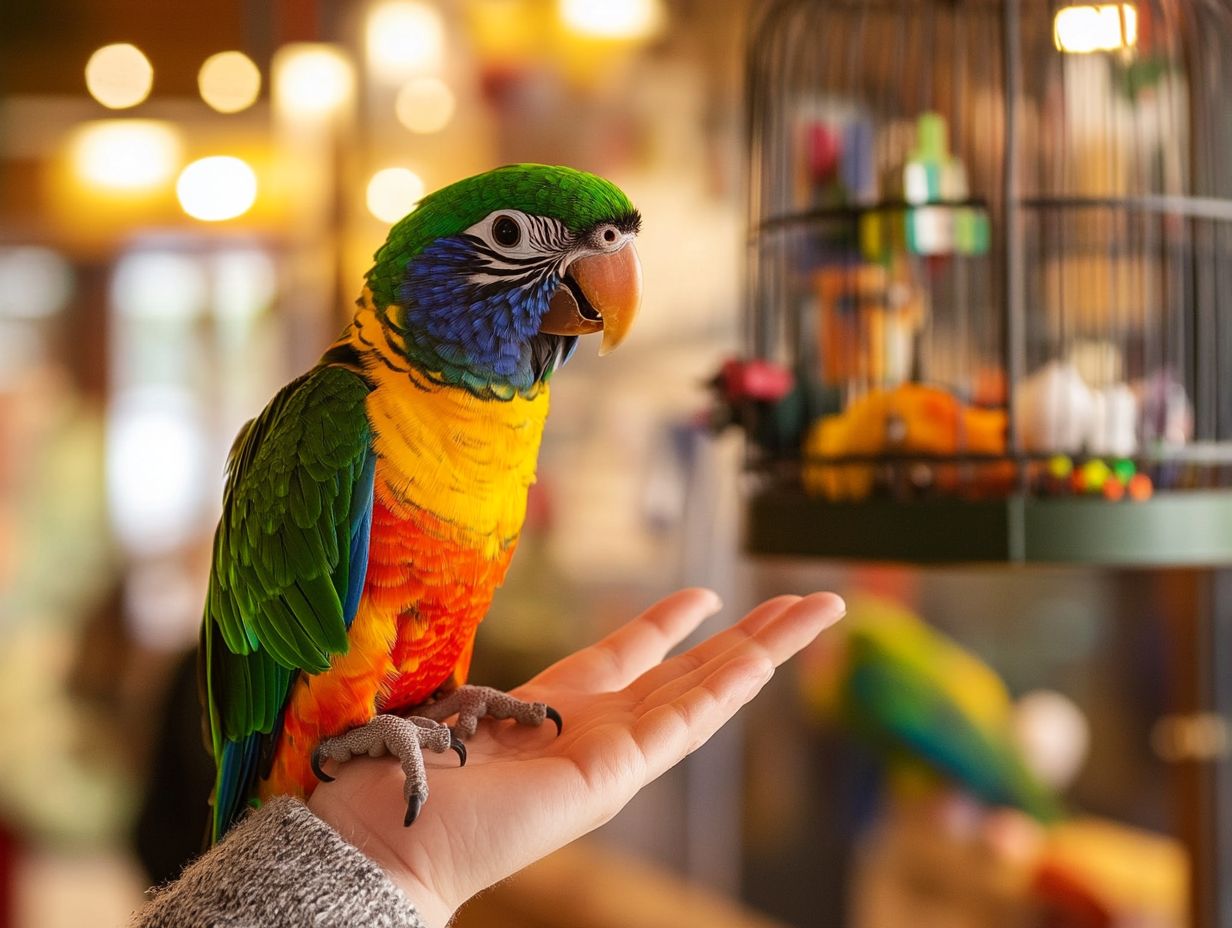
Adopted birds may have been previously mistreated or neglected, leading to behavioral issues as a result of their past experiences. Learning how to socialize your new bird can help them overcome these challenges.
How can I help my adopted bird overcome its behavioral issues?
Patience, consistency, and positive reinforcement are key in helping adopted birds overcome their behavioral issues. Learning how to modify your bird’s behavior can also be beneficial, and seeking the help of a bird behaviorist may further assist in the process.
What should I do if my adopted bird shows signs of aggression?
If your adopted bird displays aggressive behavior, it is important to remain calm and avoid reinforcing the behavior. Seek the help of a professional to address and correct the underlying cause of the aggression.
Will my adopted bird’s behavioral issues ever completely go away?
It is possible for adopted birds to overcome their behavioral issues, but it may take time and patience. Understanding the needs of rescued birds is crucial, as some may always have certain behaviors. However, with proper training and care, these behaviors can be managed and minimized.
Can handling techniques help with my adopted bird’s behavioral issues?
Yes, proper handling techniques can play a crucial role in addressing and correcting your adopted bird’s behavioral issues. Handle your bird gently and consistently, and avoid any negative reinforcement.

